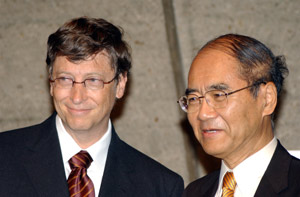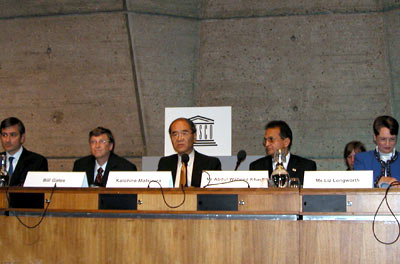UNESCO and Microsoft Sign Cooperation Agreement to Help Bridge the Digital Divide
17-11-2004 (Paris)

Microsoft today joined the coalition of major private sector partners supporting UNESCO’s global strategy to draw on information and communication technologies (ICT) to improve education, social and economic development worldwide.
The Director-General of UNESCO, Koïchiro Matsuura, and Bill Gates, Microsoft’s Chairman and Chief Software Architect, signed a cooperation agreement at Organization Headquarters in the presence of Hans-Heinrich Wrede, Chairman of the Executive Board, and Ambassador Louise Oliver, Permanent Delegate of the United States of America to UNESCO.
The agreement defines eight areas in which UNESCO and Microsoft will work together, exchanging experiences, know-how and developing projects:
“We are excited by and welcome this new relationship,” the Director-General of UNESCO said. “It provides an opportunity for UNESCO to put into practice the international strategic partnership advocated by the United Nations to bridge the digital divide. […] We have a greater chance of accelerating social and economic development if we work collectively than if each organization works in isolation,” Mr Matsuura pointed out. “We know we live in a world where poverty, conflict and exclusion destroy hope for far too many people. […] The effective use of information and communication technologies can play a major role in building human capacities for sustainable livelihoods, including supporting education and learning.”
“We are honoured to partner with UNESCO on this important initiative,” said Mr Gates. “Our shared goal is to help remove barriers to digital inclusion and enable people around the world to realize the full potential of technology – through education and skills development programmes, community access, and the preservation of cultural and language diversity. Technology is a crucial resource in today’s world, but remains beyond the reach of millions of people. We hope to play a part in changing that.”
The partnership in the agreement signed today is strategic in that it is based on the exchange of knowledge and experience rather than funding. The agreement, for example, envisions the building of knowledge communities, i.e. web-based communities of practice, which will facilitate the pooling of intellectual resources independently of geographical barriers.
The agreement emphasizes the need to develop a teacher training syllabus on how to integrate ICT in the classroom. The intention is to provide guidance and global benchmarks to improve the quality of training for teachers on the use of ICT. This will be a multistakeholder initiative with key foundation partners.
The relationship between Microsoft and UNESCO is not exclusive, and Mr Matsuura reaffirmed the Organization’s continued support for different software models, both proprietary and open-source software, in keeping with Paragraph 27 of the Declaration adopted by the international community at last year’s World Summit on the Information Society.
UNESCO Press Release No 2004-106
The agreement defines eight areas in which UNESCO and Microsoft will work together, exchanging experiences, know-how and developing projects:
- education and learning;
- community access and development;
- cultural and linguistic diversity and preservation;
- digital inclusion and capacity;
- exchange and promotion of best practices on the use of ICT for socio-economic development;
- fostering web-based communities of practice, including content development, knowledge sharing and empowerment through participation;
- facilitating exchange of information and of software applications;
- sharing expertise and strategies.
“We are excited by and welcome this new relationship,” the Director-General of UNESCO said. “It provides an opportunity for UNESCO to put into practice the international strategic partnership advocated by the United Nations to bridge the digital divide. […] We have a greater chance of accelerating social and economic development if we work collectively than if each organization works in isolation,” Mr Matsuura pointed out. “We know we live in a world where poverty, conflict and exclusion destroy hope for far too many people. […] The effective use of information and communication technologies can play a major role in building human capacities for sustainable livelihoods, including supporting education and learning.”
“We are honoured to partner with UNESCO on this important initiative,” said Mr Gates. “Our shared goal is to help remove barriers to digital inclusion and enable people around the world to realize the full potential of technology – through education and skills development programmes, community access, and the preservation of cultural and language diversity. Technology is a crucial resource in today’s world, but remains beyond the reach of millions of people. We hope to play a part in changing that.”
The partnership in the agreement signed today is strategic in that it is based on the exchange of knowledge and experience rather than funding. The agreement, for example, envisions the building of knowledge communities, i.e. web-based communities of practice, which will facilitate the pooling of intellectual resources independently of geographical barriers.
The agreement emphasizes the need to develop a teacher training syllabus on how to integrate ICT in the classroom. The intention is to provide guidance and global benchmarks to improve the quality of training for teachers on the use of ICT. This will be a multistakeholder initiative with key foundation partners.
The relationship between Microsoft and UNESCO is not exclusive, and Mr Matsuura reaffirmed the Organization’s continued support for different software models, both proprietary and open-source software, in keeping with Paragraph 27 of the Declaration adopted by the international community at last year’s World Summit on the Information Society.
UNESCO Press Release No 2004-106

Related themes/countries
· Private Sector Partnerships
Share this story:
Contact information
- UNESCO Press Release
Source














